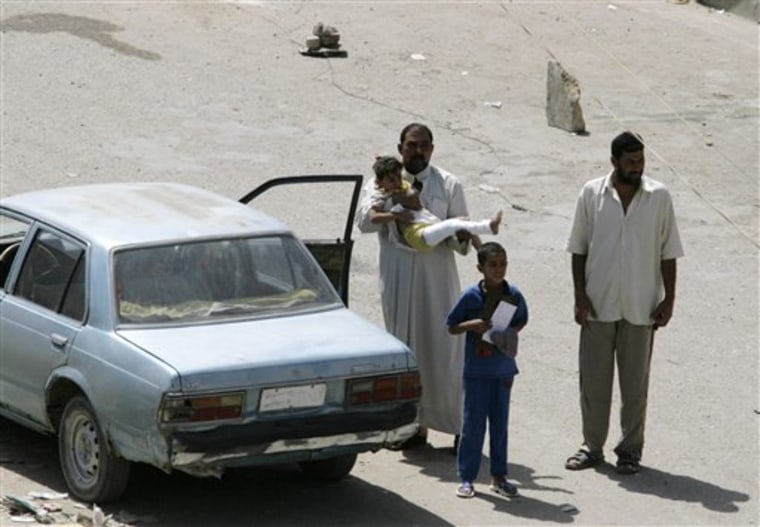Radical Shiite cleric Muqtada al-Sadr called for an end to Iraqi bloodshed on Friday and said his threat of an "open war" applies only to U.S.-led foreign troops — stepping back from a full-blown confrontation with the government over a crackdown against his followers.
Prime Minister Nouri al-Maliki, meanwhile, took a hard line against al-Sadr's Mahdi Army militia and other illegally armed groups, setting conditions for stopping military operations against them that included surrendering weapons.
Al-Sadr's new message, which was read during prayers and posted on his Web site, eased fears that the anti-U.S. cleric was planning to lift a nearly 8-month-old cease-fire, a move that would jeopardize recent security gains.
"If we have threatened an open war until liberation, we meant a war against the occupier," the cleric said in the statement. Al-Sadr is believed to be in Iran.
Mahdi Army fighters have clashed daily with U.S.-backed Iraqi security forces since al-Maliki launched a crackdown against militias on March 25. Last week, al-Sadr issued what he called a "final warning" to the Shiite-led government to halt its offensive or face an "open war until liberation."
Al-Sadr urges an end to recent battles
But Friday's sermon appeared to be an attempt to ease the showdown. Al-Sadr called on his followers to adhere to the cease-fire order and urged an end to the recent battles, which have left dozens of civilians dead or injured.
"I call upon my brothers in the police, army and Mahdi Army to stop the bloodshed," al-Sadr said in the statement. "We should be one hand in achieving justice, security and in supporting the resistance in all of its forms."
He also appealed to Iraqi troops not to fight alongside the Americans, but did not directly call on his fighters to attack the Americans.
"This is an open war between us and the occupier, so do not interfere in favor of the occupier," he added.
The offensive began in the oil-rich city of Basra, but an Iranian-brokered truce calmed the situation there and the recent fighting has focused mainly in Sadr City, a district of 2.5 million people in northeastern Baghdad.
The Sadrists accuse al-Maliki, a political rival, of trying to sideline them ahead of expected provincial elections in the fall. But they appear divided over whether to launch a full-scale fight against U.S.-led forces or focus on political efforts.
Mahdi Army commanders, who have said they have recently taken delivery of new Iranian weapons, expressed disappointment that the cleric had not given them a green light for an offensive.
"Al-Sadr has made it clear that the open war is directed against the Americans. We will continue to fight the Americans and if the Iraqi soldiers attack us, we will strike back," said one militia commander who identified himself only by his nickname Abu Thar.
Senior al-Sadr aide, Hazim al-Aaraji, however, said the new message was intended to lessen tensions in Basra and Sadr City.
Sadr City residents, who have found themselves under a virtual siege because of the clashes, welcomed the statement.
"It is a sign that al-Sadr is willing to end our misery," said Naji Mohammed, a 42-year-old government employee. "We are without work, services and food."
But al-Maliki, who also has threatened to politically isolate al-Sadr if he doesn't disband the Mahdi Army, laid down four conditions that are unlikely to be met.
In an interview with Al-Arabiya TV, he said the group surrender heavy and medium weapons, cease interference in the affairs of the state as well as the security forces, hand over all wanted people and present lists of names of people involved in violence.
"I do not negotiate with any outlaw armed group, not the Mahdi Army nor the Islamic Army (a Sunni insurgent group) nor any other group because this contradicts the principles of the state," al-Maliki said.
He also played down the success of the cease-fire in quelling the violence.
"The problem is that what is said to the media is different from reality," al-Maliki said. "The activities of the Mahdi Army never stopped."
Avoiding Sadr City casualties
The Iraqi defense minister, Abdul-Qadir al-Obeidi, said his forces have avoided an all-out assault on Sadr City to avoid civilian casualties.
"We have the ability to launch a military operation in Sadr City at any time, but we should remember that there are about 2.5 people living there," al-Obeidi told reporters after meeting with Iraqi President Jalal Talabani. "The safety of the Sadr City residents is a priority to us."
The U.S. military said Friday that American and Iraqi forces killed 10 militants in overnight clashes in northeastern Baghdad — most in airstrikes.
Local hospital officials, speaking on condition of anonymity because they were not authorized to speak to the media, said seven people, including two women, were killed and 45 others were wounded in the clashes that were centered in Sadr City.
In other violence, an Iraqi radio journalist, Jassim al-Batat, was killed in a drive-by shooting in the town of Qurna, north of Basra, according to his al-Nakhil station and police.
The U.S. military also said a U.S. soldier was killed Thursday in a roadside bombing south of Baghdad. At least 4,052 members of the U.S. military have died since the beginning of the Iraq war in March 2003, according to an Associated Press count. The figure includes eight military civilians. At least 3,301 died as a result of hostile action, according to the military's numbers.
